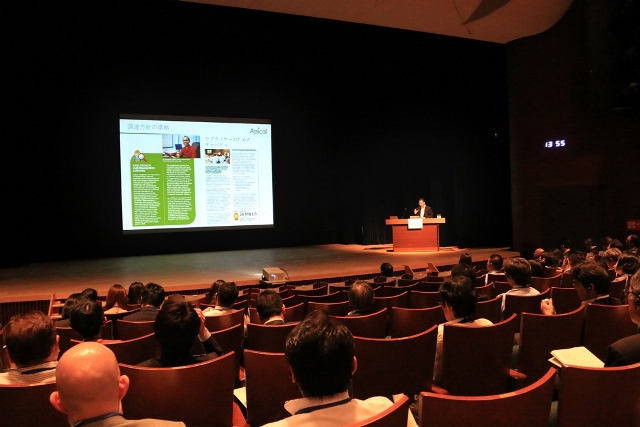The Japan Sustainable Palm Oil Conference 2018 (JaSPOC2018) took place at the IINO Hall & Conference Center in Tokyo, Japan on 22 October. The annual event was attended by organisations such as WWF, Kao Corporation, Ajinomoto, Nissin Foods Holding, AEON Co and Lion Corporations to name a few.
Apical is proud to have been an invited guest to present at this major event. Apical’s Director of Sustainability, Bremen Yong delivered a session on the topic ‘Towards Improvement in Palm Oil Supply Chain Transparency’ and shared key points on Apical’s supplier engagement efforts in achieving traceability and sustainable development.
The presentation also discussed the challenges faced by the industry in achieving traceability which included landscape-level issues, complex supply chain structures, deforestation, policy compliance, lack of market incentives, obstacles in adoption and duplicated efforts by various parties.
Apical took the opportunity to share its traceability solution using blockchain technology that expects to measure, monitor and assure supply chain compliance to social, environmental and legal requirements as well as improve global market access and transparency – through its SUSTAIN collaboration with established names in the industry.
SUSTAIN (Sustainability Assurance & Innovation Alliance) is geared to achieve alignment among all palm oil stakeholders through the use of blockchain technology that is driven by users, as opposed to being another traceability tool. SUSTAIN aims to address landscape-level issues through a practical and cost efficient chain of custody that is inclusive along the supply chain down to dealers and smallholders.
It will offer incentives such as credit, microfinancing and ESG loans as well as global market access and recognition using SAP Leonardo, the innovation platform supporting new technology such as machine learning, artificial intelligence and blockchain. SUSTAIN will establish an open system offering downloadable tools that can be freely used by all parties in the palm oil supply chain for monitoring traceability and policy compliance, and assist estates, dealers and smallholders in managing (fresh fruit bunch) FFB collection, payments, yield enhancements, ESG/microfinancing for replanting and various other market incentives.
SUSTAIN is currently in Phase 1 of the project’s implementation – Formation of SUSTAIN and Traceability (Proof of concept and Pilot) which is expected to be assessed mid-next year. The success of Phase 1 will determine the kick off timeline of Phase 2 – Policy Compliance & Monitoring.
